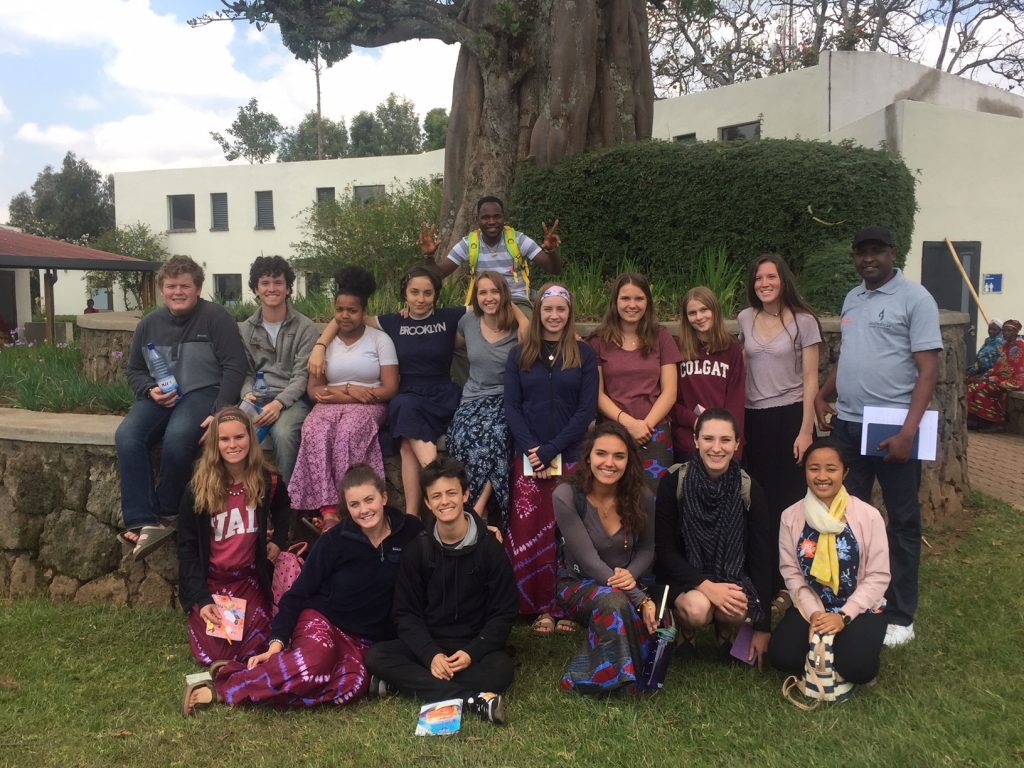This post contains student writing.
Dirt and dust kicked up by the wheels of the bus drifted in through the windows and crunched between my teeth every few seconds. Everyone used their shifts as air filters to protect their lungs from the dust as the bus traveled down the direct road to the Partners in Health (PIH) Butaro Hospital in Burera District.
While residing in Nyamata a week and a half ago, the group took a day trip to Partners in Health Rwinkwavu. There, we gathered around a conference table as we learned about the PIH organization and Rwandan healthcare. Dr. Shyaka led the discussion and informed us about how PIH is attempting to work alongside the Rwandan government to improve quality of care at the community level. We learned that Nobel Peace Prize winner Dr. Paul Farmer is a co-founder of the organization and how PIH has locations in three districts of Rwanda and are looking to expand to new areas of the country when the needs in those districts have been met. Dr. Shyaka shared that the most fulfilling part of his job is providing homes for those families who cannot necessarily afford them. The funding for homes is part PIH’s holistic approach towards health care: if patients are cured at the hospital but do not have safe homes or adequate nutrition to return to, then treatment at the hospital can only help so much.
After the incredibly informative discussion, a general practitioner at the hospital took us around and showed us the hospital facilities. He briefly described each department that the Rwinkwavu hospital has to offer. He spend time talking about the maternity and neonatal departments, as that is a major focus of that hospital. While giving us the tour of the hospital, the doctor was constantly approached by a nurse asking him to sign small pieces of paper for patient prescriptions. I found it amazing that the doctor took time out of his day to give us a tour of his work place while still being able to address the needs of his patients.
Today, we arrived at the Butaro Hospital after the bumpy bus ride. We were greeted by Dr. Egide, our tour guide for the day. Butaro looked very different from Rwinkwavu: a more modern building sat atop the hill. Having been built in 2011, Butaro had more modern features with some updated technology. First, Dr. Egide took us to the lab where pathologists work to diagnose patients. Directly following, we were taken into the pathology lab where we saw high-tech machines used for biopsies and diagnoses. Dr. Egide then took us to the other wings of the hospital. Unlike Rwinkwavu, Butaro’s main focus is oncology, with both strong pediatric and adult oncology treatment programs. We also saw the construction site where PIH is building a residential unit for oncology patients who live far away but must come to the hospital for treatment.
In the pediatric oncology unit, we met Dr. Hanna, a pediatric oncologist from the University of Pennsylvania, who works in Rwanda to treat children with cancer. During lunch time, I had the opportunity to ask her many questions about her career. Having just finished her residency, Dr. Hanna decided to work on and off in Rwanda with Partners in Health. Instead of staying in Philadelphia, Dr. Hanna decided to volunteer her time in Butaro because of her interest in global health. In addition to oncology, Butaor specialized in mental health, having their own mental health center to treat patients. Dr. Hildegard gave a talk on mental health, addressing many questions we all had. Through the tour of Buator, a woman named Rachel joined our group to learn more about PIH. Given a grant by the University of Washington to travel the world and research mental health systems over the course of eight months, Rachel asked many insightful questions that everyone in our group learned from. After thanking all of the doctors at Butaro, we headed back along the bumpy dirt road to Musanze.
I have greatly enjoyed learning about public health, healthcare in Rwanda, and the work that Partners in Health is doing in this country. It’s been interesting to see how different the Rwandan healthcare system is from that of the United States!
–Nelson


